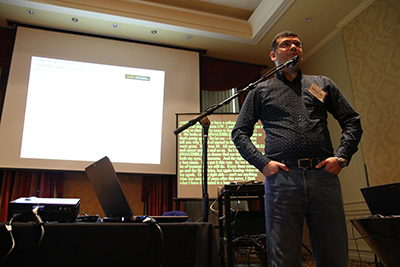Samee

I am an associate professor of electrical and computer engineering at North Dakota State University. I teach computer engineering courses including computer architecture, computer systems, and an introductory programming class.
In 2012, I was diagnosed with glaucoma and keratoconus. After the diagnosis, I was left asking many questions: how it happened, why it went undetected for years, why there are no plausible treatments for these diseases? With the support of my family, I snapped out of it and channeled my energy in constructive directions. I came to the conclusion that what is done is done, and what I needed to do is to help others.
With this thought in mind, I applied for a grant under the National Science Foundation’s Gender and Age-Related Disabilities Engineering (GARDE) program. The grant works to develop cyber-physical system and cloud computing based solutions for returning veterans with disabilities to assist in their reintegration into an educational environment (college, university or vocational training). We are now in the second year of the five-year grant. Every project we finish distracts me from my own developing disability and makes me grateful for all of the abilities that I have.
However, working on these projects also has identified an inherent issue in our approach to engineering education: a lack of emphasis on universal design. A universally designed product is designed to be accessible to and usable by the largest group of people possible, regardless of their abilities. Although some engineers feel passionate about universal design, but during the requirements capturing phases of the design process, there is not enough effort put towards developing a product that is widely usable. I wish that we, the engineering community, were more conscious about universal design so that it becomes a de facto part of the design process and thus reduces the need for accommodations and retrofitting inaccessible designs to be in compliance with federal and state laws.
My particular disability will eventually lead to blindness, unless a cure is found. Prior to my diagnosis, I really (unfortunately) never thought about how people with disabilities approach life and how technology serves to support them. I wish I had been tuned into these issues earlier. Regardless, now I am dedicated to enriching the lives of people with disabilities and advocating for increased efforts to create more universally designed products.